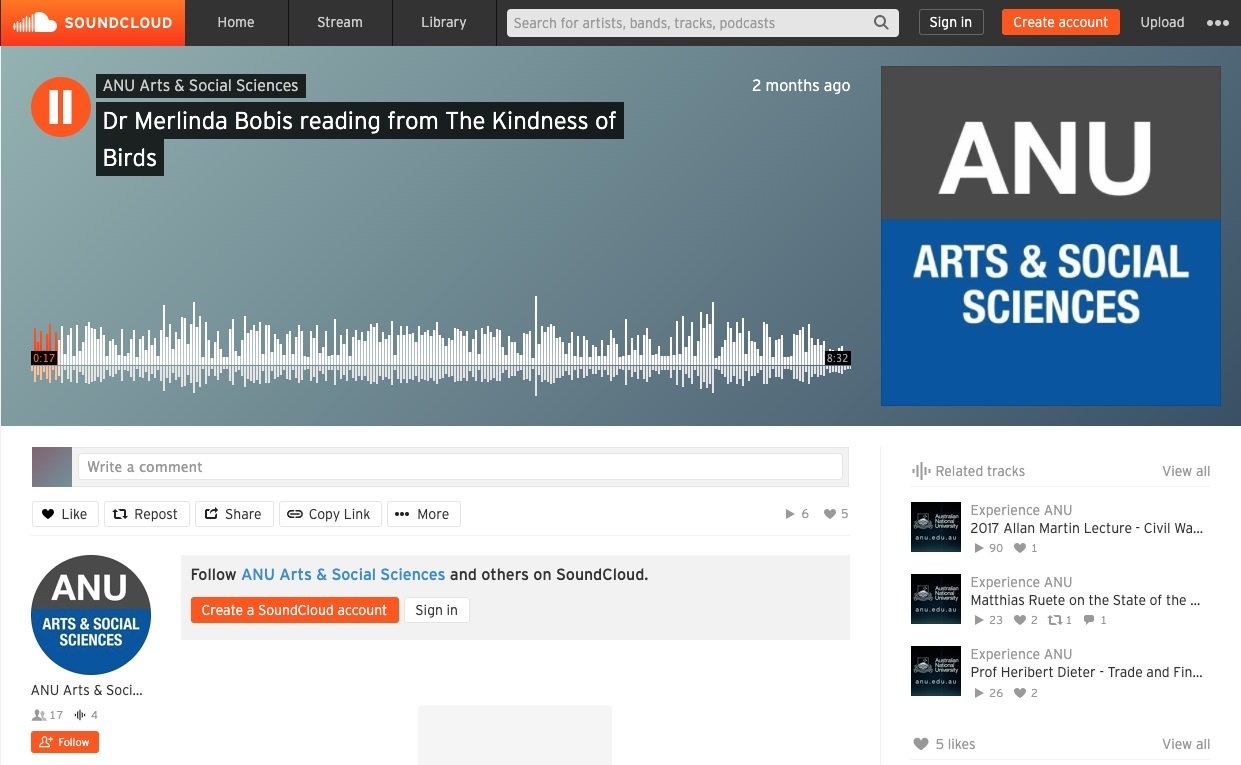 Image 1 of 2
Image 1 of 2

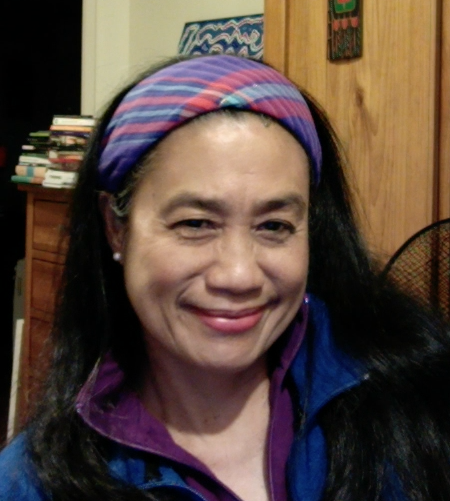 Image 2 of 2
Image 2 of 2



The Kindness of Birds
An oriole sings to a dying father. A bleeding-heart dove saves the day. A crow wakes a woman’s resolve. Owls help a boy endure isolation. Cockatoos attend the laying of the dead. Always there are birds in these linked stories that pay homage to kindness and the kinship among women and the planet. From Australia to the Philippines, across cultures and species, kindness inspires resilience amidst loss and grief. Being together ignites resistance against violence. We pull through in the company of others.
Kindness cannot self-isolate. It moves both ways and all ways, like breath.
MAY 2021 | 9781925950304 | Paperback | 152 x 229 mm | 220 pages
Merlinda Bobis is an utterly distinctive voice in Australian letters. In our ironic and cynical times, here are stories of heartfelt feeling — fulsome, tender and unabashed — in which grief and hope are equally things with feathers.
— Gail Jones, award-winning novelist
These stories are beyond beautiful and deeply moving, raw, tender, brimming with love and pain, death and life. Like “lit diamonds,” to borrow a phrase from Bobis’s own exquisite language. I love how birds are everywhere in attendance, signalling ancestral wisdom, pointing to the strength of the human spirit and its deep ties with all of life. I love how each story feels like a tonic for our time, illuminated from within by so much grace and kindness, it gives hope and inspires awe.
— Jennifer Ackerman, bestselling author of The Genius of Birds
WINNER, CANBERRA CRITICS’ CIRCLE
SHORTLISTED, CHRISTINA STEAD PRIZE FOR FICTION, NSW PREMIER’S LITERARY AWARDS 2022
An oriole sings to a dying father. A bleeding-heart dove saves the day. A crow wakes a woman’s resolve. Owls help a boy endure isolation. Cockatoos attend the laying of the dead. Always there are birds in these linked stories that pay homage to kindness and the kinship among women and the planet. From Australia to the Philippines, across cultures and species, kindness inspires resilience amidst loss and grief. Being together ignites resistance against violence. We pull through in the company of others.
Kindness cannot self-isolate. It moves both ways and all ways, like breath.
MAY 2021 | 9781925950304 | Paperback | 152 x 229 mm | 220 pages
Merlinda Bobis is an utterly distinctive voice in Australian letters. In our ironic and cynical times, here are stories of heartfelt feeling — fulsome, tender and unabashed — in which grief and hope are equally things with feathers.
— Gail Jones, award-winning novelist
These stories are beyond beautiful and deeply moving, raw, tender, brimming with love and pain, death and life. Like “lit diamonds,” to borrow a phrase from Bobis’s own exquisite language. I love how birds are everywhere in attendance, signalling ancestral wisdom, pointing to the strength of the human spirit and its deep ties with all of life. I love how each story feels like a tonic for our time, illuminated from within by so much grace and kindness, it gives hope and inspires awe.
— Jennifer Ackerman, bestselling author of The Genius of Birds
WINNER, CANBERRA CRITICS’ CIRCLE
SHORTLISTED, CHRISTINA STEAD PRIZE FOR FICTION, NSW PREMIER’S LITERARY AWARDS 2022

Media Coverage
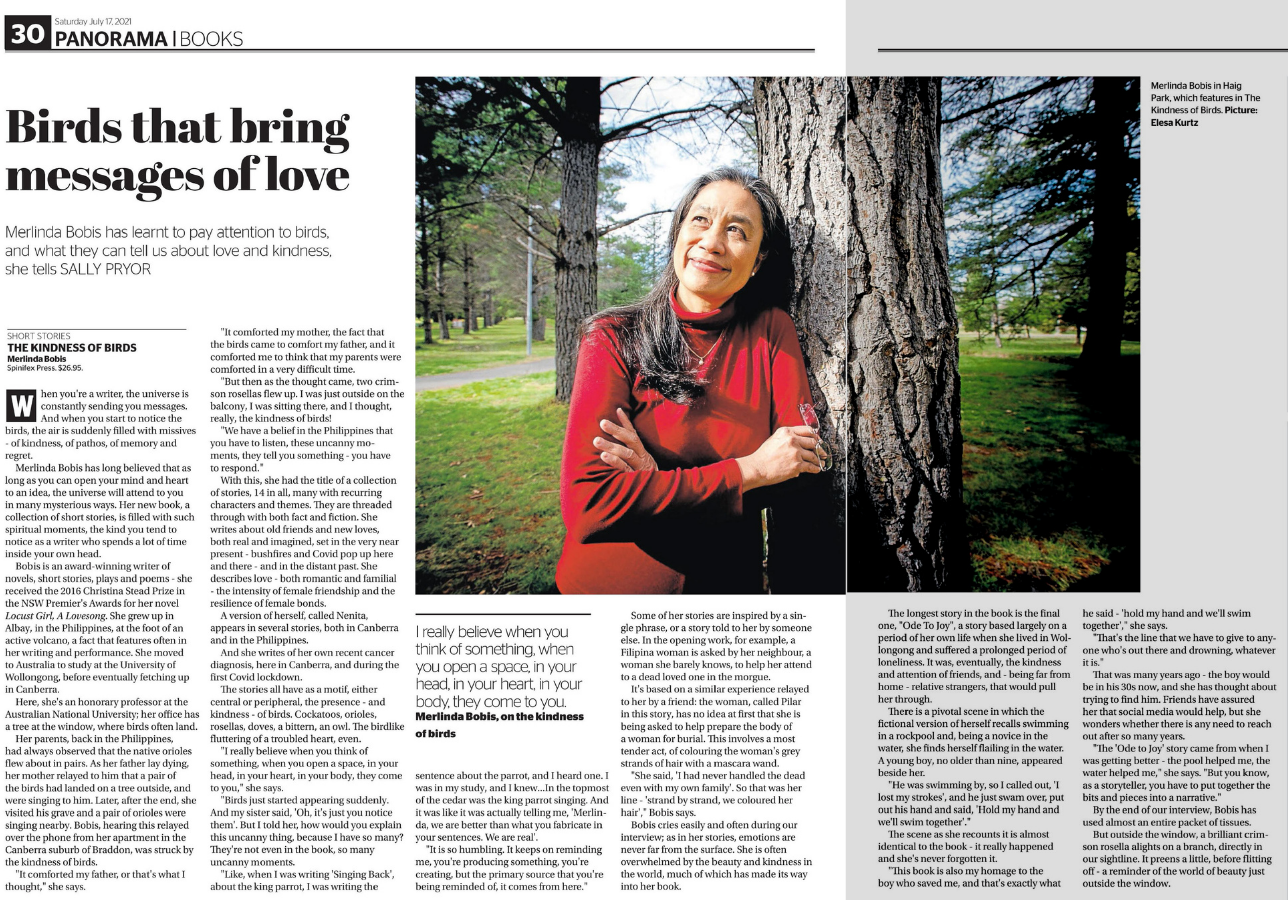
Merlinda Bobis in The Canberra Times 17th July 2021. Read online here.

Listen to Merlinda talk to the ABC Book Show about the writing of The Kindness of Birds and how she has embraced radical kindness in her collection of short stories.
Merlinda was awarded a Canberra Critics' Circle Award for this book.
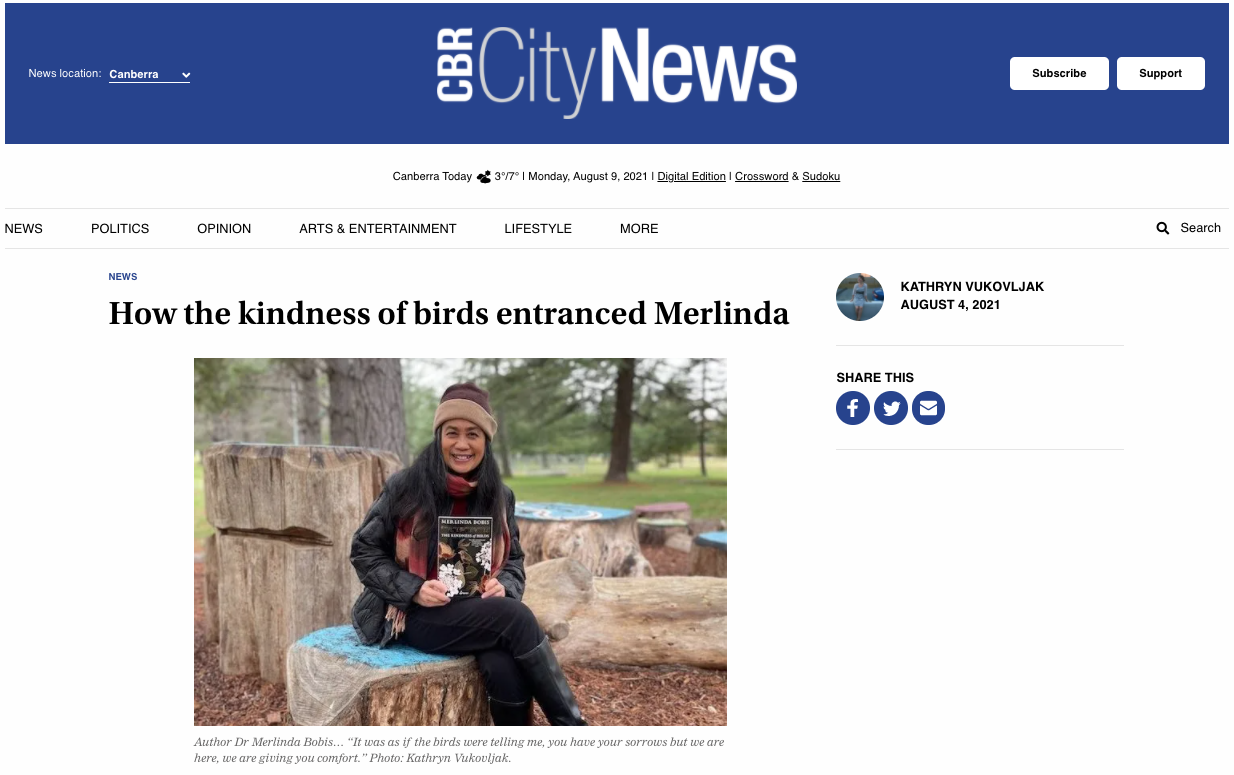
Merlinda Bobis in the Canberra City News 4 August 2021.
Read the full article here.
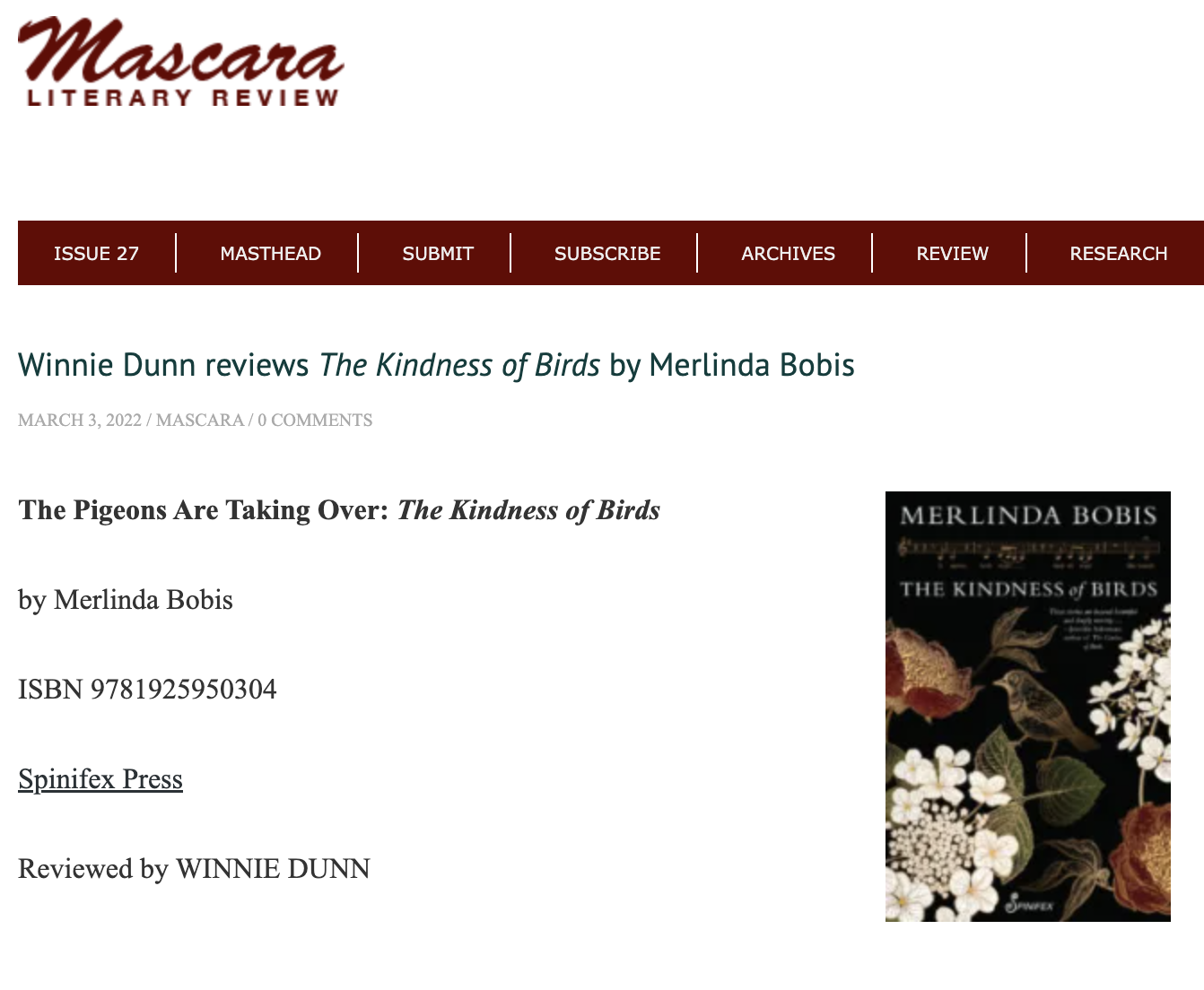
Winnie Dunn reviews The Kindness of Birds in Mascara Literary Review. You can read the full review here.
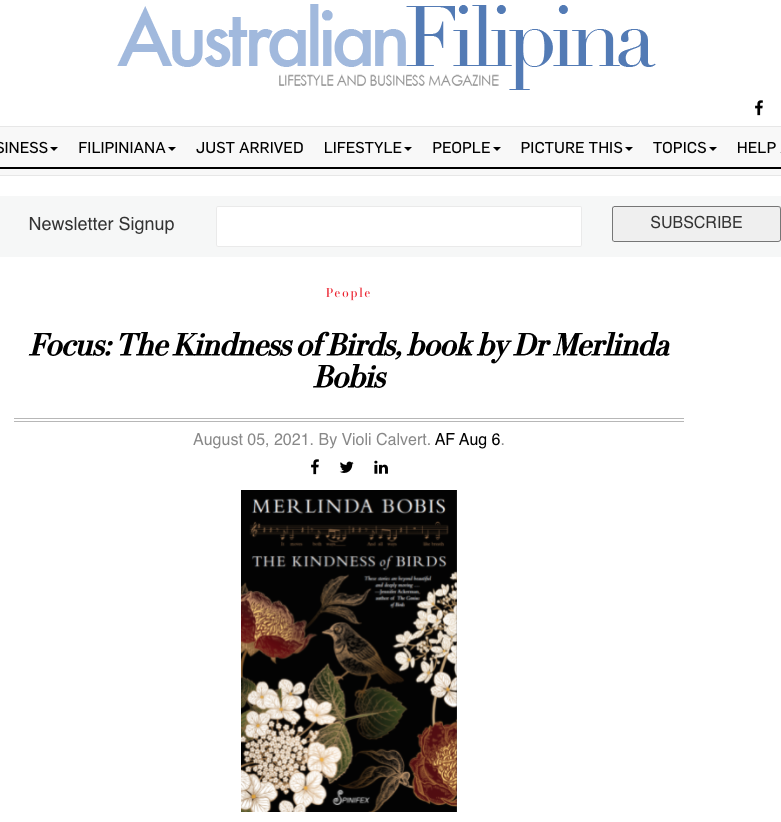
With all the feeling of helplessness around us especially during periods of lockdowns and restrictions put on by the government officials in the attempt to prevent the spread of the virus, we welcome The Kindness of Birds, the new book of Dr Merlinda Bobis, as a good read to uplift us as we follow the 'stay at home' health rule.
The Australian Filipina is glad to share our conversation with Merlinda, a prolific Pinay author, poet, playwright, lecturer and advocate for social justice, women empowerment, the environment and multiculturalism to gain an insight about TKOB and her persona.
Read a Q&A with Merlinda Bobis in the AustralianFilipina Lifestyle & Business Magazine here
Reviews
If the ibis is what I took into my reading of The Kindness of Birds, the Rainbow lorikeet is what I took away from it, long after I had turned the last page. Read the full review here.
— Winnie Dunn, Mascara Literary Review
These stories are beautifully written. Bobis has written six books of poetry, and it shows in the prose, the writing demanding appreciation.This collection recognises that we, regardless of race, or even species, are all in this together. Never has this been more evident, or more important, than today with COVID and climate change. Global problems affect all life on this planet. These stories acknowledge this, while also filling the reader with hope and inspiration. Read more (subscribers only)
— Neale Lucas, Good Reading Magazine
Merlinda Bobis, with a seemingly effortless touch, has compiled short story chapters which link in subtle ways and glide over time, sometimes in the past and often in the present. It is a novel in an unusual form but expands and reveals aspects of the characters and their histories that sharply illumines. This is so well handled that it is unsurprising that she has successfully published four novels, six books of poetry and had dramatic works performed. Read more— Patricia Simms-Reeve, The Queensland Reviewers Collective
The literary brilliance of Merlinda is in its fullness in this book.— The Halo-Halo Review, read the full review here.
‘Love sings in any language.’Contained within the beautiful cover of this book are fourteen short stories. They are linked, sharing common characters and the symbolism of birds. The stories are set in Australia and the Philippines and pay homage to kindness and kinship.
Each of these stories spoke to me, but my absolute favourite was ‘Grandma Owl’.
—Jennifer Cameron-Smith, GoodReads Review
I adored this short story collection.…Highly recommended. I just hope there are enough copies left by the time I can get around to buying my own.
—Kim, GoodReads Review
Never have I ever read a book that has brought me to tears over the course of days until now. The Kindness of Birds by the amazing Merlinda Bobis feels like an embrace by all who show us kindness and joy, from our Moms and Dads, Lolas and neighbors, grandchildren, nieces, nephews and siblings, very much like the overseas Filipino workers who come back home.—Ayesha Jimenez, GoodReads Review
Read reviews on GoodReads here
The 14 linked short stories
‘O Beautiful Co-Spirit.’ At a Belconnen funeral parlour, Filipina-Australian Pilar and Malaysian-Australian Farah dress Farah’s deceased lover Lucia, an Italian-Australian, while trying to make peace after a fight over noisy cockatoos. As they lay the dead, both remember rituals from their respective Catholic and Islamic traditions, and their shared belief in kindness for all who pass.
‘When the Crow Turns White.’ During the 2020 hailstorm in Canberra, in the Parliament House courtyard, a crow is injured. The elemental develops into a magical story about grace and kindness that overturn politics and spin, and domestic violence. This event changes the life of Corazon, a Filipina-Australian who cleans the chamber of the House of Representatives with her friend Orla, an Irish-Australian.
‘The Kindness of Birds.’ After the death of her parents, Filipina-Australian Nenita and her Latvian-Australian husband Arvis walk along Lake Burley Griffin comforted by a host of birds real and remembered between Legazpi (Philippines) and Canberra (Australia), especially the orioles who sang to her father as he was dying. This comfort inspires her to believe that ‘She’ll be apples, she’ll be birds.’
‘The Air of the Times.’ In a Manila hotel, poet Remy and sister Belen, a revolutionary, reconnect. Their touchstone is a bottle of Nina Ricci perfume L’Air Du Temps (“The Air of the Times”) with a cap of intertwined doves: a gift from Remy’s friend, 86-year old Werner who just died in Sydney. The German Jew lost his family in the Holocaust. Between his and the sisters’ story of loss and war in the Philippines and Germany, the air of time flows with the hope for peace.
‘Candido’s Revolution.’ In 1800s Broome, indentured ‘Manilamen’ pearl divers, Candido and Francisco, win the lottery and donate their winnings towards buying a printing press that assists the Philippine revolution against colonial Spain. They turn revolutionaries and are executed by the Spanish in 1897. With these historical facts, in 2019 Remy researches Candido’s story in Broome and conjures a love story set in 1893 between Candido and Mary, a Noongar woman. It’s Remy’s way of coming to terms with the assassination of her sister Belen in Manila in 1996. Birds from these different periods hover around the layered storytelling.
‘My Tender Tender.’ At The Roey’s bar in Broome, Nenita and Arvis meet 91-year old Aboriginal Uncle Freddy, a Filipino-Javanese-Yawuru who’s one of the last remaining hard-hat pearl divers of Broome and Darwin. The meeting reveals kinships in story and grief: Nenita’s father has just died at 91.
‘My Father’s Australia.’ It’s the wake of Nenita’s father in Legazpi. In the coffin, he’s dressed in a blue suit that she bought from DJs years ago, so he could fly “looking nice” when he visits her in Australia. The visit never happened. In this story of loss and broken family ties woven across Legazpi, Canberra and Charles de Gaulle airport, Nenita is sustained by remembering kindness, notwithstanding the lack of it.
‘Naming the Flowers.’ After her mother’s funeral, Nenita cleans up the family house in Legazpi. She finds a poem written in her mother’s longhand and the photos of the flowers in her mother’s garden, and those that friends in Canberra gave her after her father died. Between the memory of naming the flowers with her mother in this house and with her friends in Canberra, she tries to name her grief. In her chest, a bird tries to fly out.
‘The Sleep of Apples.’ As the bushfires rage in New South Wales and Victoria, friends Nenita and Ella drive around Tasmania after not seeing each other for more than ten years. Amidst ripening apple orchards and Tassie’s irrepressible birds, they remember Robert, Ella’s ex-husband and Nenita’s friend, who hanged himself in early 2000. This unresolved loss threads other losses across the Philippines, Afghanistan, Cambodia, and the US with a restorative idyll in Penang.
‘My Love, My Nerūsē.’ COVID-19 lockdown. Nenita and Arvis affirm “kindness both ways” in relation to their histories of loss and the ongoing grieving around the world, as weebills visit the cedars outside their apartment. Nerūsē: “does not rust”, like love from Latvia to Australia, the Philippines and around the world.
‘Singing Back.’ Filipino international student Andres, an indigenous Agta from Bikol, is doing a PhD on Avian-Human Kinship at the Australian National University. He’s a casual cleaner at a Canberra hotel where he meets receptionist Sinéad, an Environmental Science student at University of Canberra. Both just lost their jobs (COVID lay-offs) when Andres learns that grandmother in the Philippines is sick with COVID. As they have their last lunch together in Haig Park, Andres’ family history on the slopes of Mayon Volcano is revealed as intertwined with his PhD on birds. The revelations weave with their “almost love story”.
‘Grandma Owl.’ Filipina-Australian Luningning and her six-year old grandson Victor are self-isolating in Wollongong after returning from the Philippines on a flight with a COVID case. They survive the quarantine with the help of Matilda, their Chilean-Australian neighbour, and a collection of owls. But Luningning is trying to survive something deeper: her unresolved grief over the death of Victor’s father.
‘Angels.’ COVID time. Nenita is diagnosed with cancer. This is her cancer journey amidst the kindness of nurses, doctors, carers, and birds — angels all!
‘Ode to Joy.’ Nenita re-traces her vexed life in Wollongong in the 90s that leads to her breakdown and aborted suicide. Her memories are threaded by the constancy of water, birds, and kindred souls from different places and cultures — all that kept her alive and returned her to joy.







